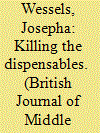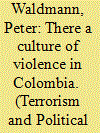|
|
|
Sort Order |
|
|
|
Items / Page
|
|
|
|
|
|
|
| Srl | Item |
| 1 |
ID:
162410


|
|
|
|
|
| Summary/Abstract |
The Black Saturday massacre that took place on 6 December 1975 in Beirut, Lebanon, marked the first large-scale targeting of Lebanese civilians during the Lebanese civil war. The magnitude of the violence committed on that day set the precedent to outbursts of violence between December 1975 and June 1976, namely the Battle of the Hotels, and the Karantina and Damour massacres which were retaliatory in nature. The circumstances surrounding the massacre remain tied to one individual in particular, Joseph Sa`adeh, who initiated the massacre upon learning of the death of his son. Considering that the construction of the Lebanese civil war narrative remains one of the most politically contested and sensitive processes in Lebanon to date, this article examines where personal motivations, grievances and convictions fit in historiographical practices, which are often centred on actions themselves, and are dismissive of the vast personal negotiations that build up to them. The article therefore offers a deeper examination of Lebanese civil war historiography, by stitching together the voices of both fighters and civilians. In doing so, the article also challenges the linear trajectories of war narratives in Lebanon that lend themselves easily to epistemological labels of sectarianism, and often ignore the arbitrariness of people's behaviour in times of extreme stress.
|
|
|
|
|
|
|
|
|
|
|
|
|
|
|
|
| 2 |
ID:
186073


|
|
|
|
|
| Summary/Abstract |
In 2013, Aleppo province was engulfed in violence. The Syrian Arab Army (SAA) and affiliated Shi’a militias executed a campaign of massacres in the rural areas located on the eastern fringes of the province. The violence caused an exodus from this region, eventually dissipating local rural communities entirely. What can explain such extreme and brutal political violence perpetrated at a local level in the east Aleppo countryside throughout 2013? To find an answer, I analyse the personal accounts of those who witnessed the violence and YouTube videos. Taken together, these sources provide a visceral description of the massacres—in particular the summary executions in the village of Rasm al-Nafl, as a case study of extreme violence in one of the poorest rural areas of Syria. Problematizing mono-causal sectarian explanations, I argue that a deeper non-sectarian complex of rurality and a process of subaltern othering in combination with opportunism, governmental retribution, and strategic military concern for territorial control in order to secure alternative supply routes to Aleppo, ultimately led to the eradication of life and cultural genocide in these rural areas.
|
|
|
|
|
|
|
|
|
|
|
|
|
|
|
|
| 3 |
ID:
040812


|
|
|
|
|
| Publication |
New York, Macmillan Company, 1973.
|
| Description |
168p.hbk
|
|
|
|
|
|
|
|
|
|
|
|
Copies: C:1/I:0,R:0,Q:0
Circulation
| Accession# | Call# | Current Location | Status | Policy | Location |
| 012126 | 954.92/PAY 012126 | Main | On Shelf | General | |
|
|
|
|
| 4 |
ID:
169384


|
|
|
|
|
| Summary/Abstract |
Contemporaneous narrative sources described the Mongol conquest of the Hungarian Kingdom in 1241–1242 as extremely devastating, characterized by extensive and indiscriminate massacres. Measuring the reality of any ancient massacre, however, tends to be difficult in the absence of sufficient archaeological or documentary data. This article integrates conquest process theory, literary evidence, and data from substantial new archaeological work to explore the motivation and nature of Mongol invasion and the consequences for rural settlements on the Great Hungarian Plain.
|
|
|
|
|
|
|
|
|
|
|
|
|
|
|
|
| 5 |
ID:
080370


|
|
|
|
|
| Publication |
2007.
|
| Summary/Abstract |
This study identifies evidence of a "culture of violence" in Colombia and discusses the structural conditions that allow or cause such a culture to arise. The thesis is that economic factors alone cannot explain violence; rather, cultural factors must be taken into account
|
|
|
|
|
|
|
|
|
|
|
|
|
|
|
|
|
|
|
|
|